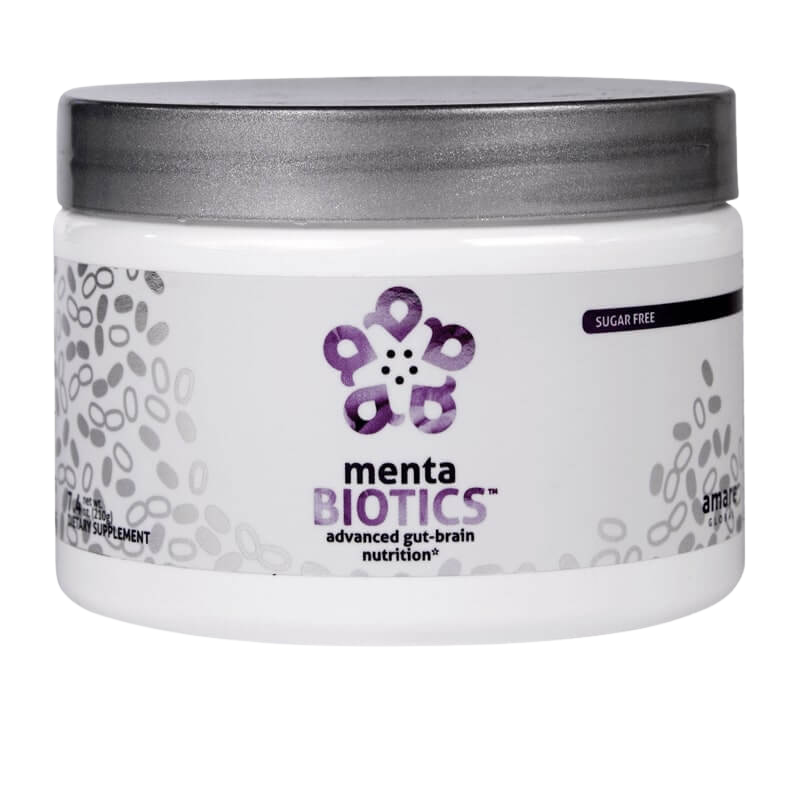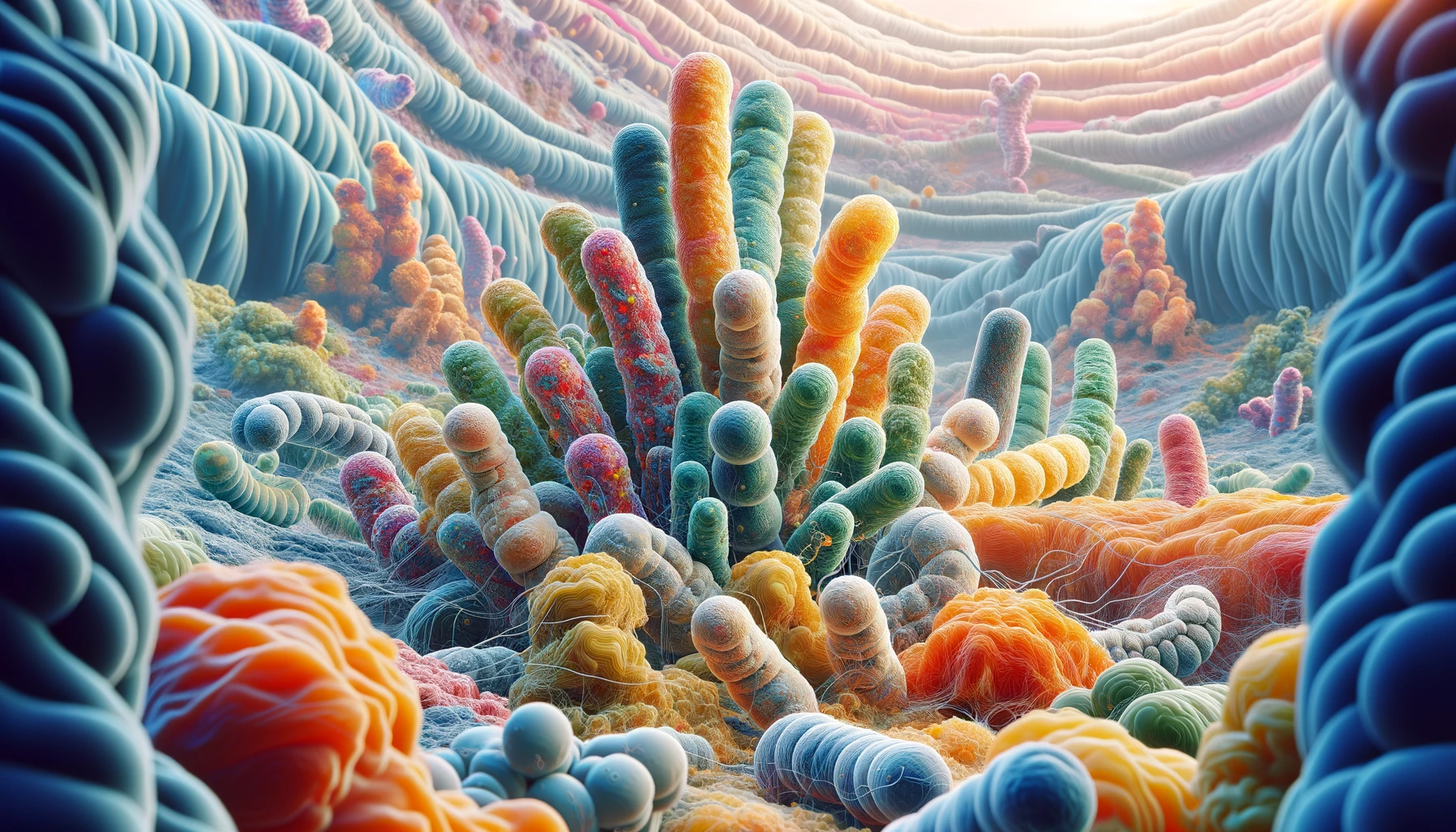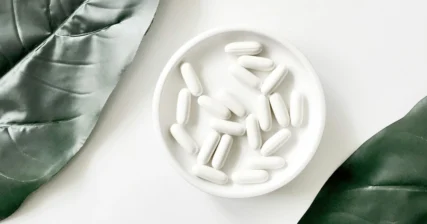For decades, probiotics have been known for their role in promoting gut health. Yet, as research delves deeper into the complex web of human biology, a fascinating subset of these beneficial bacteria emerges—psychobiotics.
These aren’t your ordinary probiotics. Psychobiotics venture beyond gut health, offering a safe and natural means of improving mental wellness. By influencing the gut-brain axis, they present a novel approach to managing mood, anxiety, and overall mental health.
This article explores psychobiotics, the science behind them, and their potential to revolutionize our approach to probiotic supplementation. We’ll delve into how these special probiotics work, what benefits they bring, and why they might just be the key to a happier, healthier mind and body.

Feel Better Fast. Guaranteed.
Energy+, EDGE, and MentaBiotics make up the Happy Juice supplement stack, with ingredients clinically proven to:
- decrease anxiousness scores by 55%
- decrease irritability scores by 60%
- decrease fatigue by 64%
- decrease anger 54%
- decrease tension by 45%
- decrease confusion by 43%
- decrease overall distress by 49%
- increase good bacteria by 70%
- decrease negative mood by 105%
- increase positive mood by 211%
What are Psychobiotics?
Psychobiotics are a novel class of probiotics that have the potential to influence mental health through the gut-brain axis.
This term was first coined to describe probiotics that could positively impact psychological health.1Sarkar A, Lehto SM, Harty S, Dinan TG, Cryan JF, Burnet PWJ. Psychobiotics and the Manipulation of Bacteria-Gut-Brain Signals. Trends Neurosci. 2016 Nov;39(11):763-781. doi: 10.1016/j.tins.2016.09.002. Epub 2016 Oct 25. PMID: 27793434; PMCID: PMC5102282. They include not only specific bacterial strains but also prebiotics that promote a gut environment conducive to mental well-being.
The evolution of psychobiotics reflects a paradigm shift in mental health management, recognizing the gut microbiota as a significant player in psychological states.2Del Toro-Barbosa M, Hurtado-Romero A, Garcia-Amezquita LE, García-Cayuela T. Psychobiotics: Mechanisms of Action, Evaluation Methods and Effectiveness in Applications with Food Products. Nutrients. 2020 Dec 19;12(12):3896. doi: 10.3390/nu12123896. PMID: 33352789; PMCID: PMC7767237.
How do Psychobiotics Work?
Psychobiotics interact with the gut-brain axis, which is a bidirectional communication system involving neural, hormonal, and immunological signaling pathways3.Ansari, Fereshteh, et al. “The Role of Probiotics and Prebiotics in Modulating of the Gut-Brain Axis.” Frontiers in Nutrition, vol. 10, 2023, https://doi.org/10.3389/fnut.2023.1173660. Psychobiotics are involved in:
- Neurotransmitter Production: Many psychobiotics can produce or stimulate the production of neurotransmitters, such as serotonin and gamma-aminobutyric acid (GABA), which play crucial roles in mood regulation. For instance, certain strains of Lactobacillus and Bifidobacterium increase serotonin levels, often referred to as the “feel-good” neurotransmitter.4Ross K. Psychobiotics: Are they the future intervention for managing depression and anxiety? A literature review. Explore (NY). 2023 Sep-Oct;19(5):669-680. doi: 10.1016/j.explore.2023.02.007. Epub 2023 Feb 20. PMID: 36868988; PMCID: PMC9940471.
- Inflammation Reduction: Chronic inflammation leads to a host of mental health issues, including depression and anxiety. Psychobiotics can modulate the body’s immune response, reducing inflammation and potentially mitigating the impact of these conditions.
- Stress Response Modulation: Psychobiotics influence the hypothalamic-pituitary-adrenal (HPA) axis, which governs the stress response. Some psychobiotics help to normalize the HPA axis’s activity, reducing the physiological effects of stress.
By targeting these mechanisms, psychobiotics offer a promising approach to mental health wellness. This holistic perspective aligns with emerging trends in mental health treatment, which seek to combine traditional methods with novel interventions for more comprehensive care solutions.
By targeting the gut microbiome, psychobiotics also help to deal with the root cause of many mental health issues rather than just treat the symptoms.
What Should You Expect to Experience When Supplementing with Psychobiotics?
Supplementing with psychobiotics can lead to a range of beneficial mental health outcomes. Here’s what you might expect:
- Improved Mood and Emotional Well-being: Many people report a noticeable uplift in their mood and a reduction in feelings of depression and anxiety, attributed to the balance of gut microbiota and its effect on neurotransmitter levels.
- Enhanced Cognitive Functions: Emerging evidence suggests that psychobiotics may improve cognitive processes, including memory, attention, and problem-solving skills, possibly by reducing inflammation and oxidative stress within the brain.
- Stress Resilience: With regular supplementation, you might find yourself better equipped to handle stress, thanks to the normalization of the HPA axis and a decrease in cortisol levels, the body’s primary stress hormone.
- Sleep Quality: Some psychobiotics can also influence sleep patterns, leading to improved sleep quality and duration, which in turn supports overall mental health and cognitive function.
It’s important to note that experiences can vary based on individual health conditions, the strains of psychobiotics used, and lifestyle factors. Consulting with a healthcare professional before starting any new supplementation regimen is advisable to ensure it aligns with your specific health needs and goals.
Probiotics That Have Psychobiotic Effects
Emerging research has identified several probiotic strains with promising psychobiotic effects. These strains offer mental health benefits, from mood enhancement to cognitive improvement:
- Bifidobacterium longum R0175: This specific strain has been shown to reduce stress and improve mood by affecting serotonin, a key neurotransmitter involved in feelings of happiness and well-being.5Messaoudi, M., Lalonde, R., Violle, N., Javelot, H., Desor, D., Nejdi, A., Bisson, J. F., Rougeot, C., Pichelin, M., Cazaubiel, M., & Cazaubiel, J. M. (2011). Assessment of psychotropic-like properties of a probiotic formulation (Lactobacillus helveticus R0052 and Bifidobacterium longum R0175) in rats and human subjects. British Journal of Nutrition, 105(5), 755-764. It also contributes to improved mood and cognitive function, vital for overall mental health and resilience.
- Lactobacillus helveticus R0052: Studies show that Lactobacillus helveticus R0052 can regulate levels of GABA, an important neurotransmitter that helps control feelings of fear and anxiety.6Bravo, J. A., Forsythe, P., Chew, M. V., Escaravage, E., Savignac, H. M., Dinan, T. G., Bienenstock, J., & Cryan, J. F. (2011). Ingestion of Lactobacillus strain regulates emotional behavior and central GABA receptor expression in a mouse via the vagus nerve. Proceedings of the National Academy of Sciences, 108(38), 16050-16055. Research also shows that Bifidobacterium longum R0175 and Lactobacillus helveticus R0052 may work synergistically to enhance mental function.7De Oliveira FL, Salgaço MK, de Oliveira MT, Mesa V, Sartoratto A, Peregrino AM, Ramos WS, Sivieri K. Exploring the Potential of Lactobacillus helveticus R0052 and Bifidobacterium longum R0175 as Promising Psychobiotics Using SHIME. Nutrients. 2023 Mar 21;15(6):1521. doi: 10.3390/nu15061521. PMID: 36986251; PMCID: PMC10056475.
- Lactobacillus rhamnosus (GG): This strain may have a significant impact on neurotransmitter levels, influencing mood and anxiety.8Tette FM, Kwofie SK, Wilson MD. Therapeutic Anti-Depressant Potential of Microbial GABA Produced by Lactobacillus rhamnosus Strains for GABAergic Signaling Restoration and Inhibition of Addiction-Induced HPA Axis Hyperactivity. Curr Issues Mol Biol. 2022 Mar 22;44(4):1434-1451. doi: 10.3390/cimb44040096. PMID: 35723354; PMCID: PMC9164062.
- Bifidobacterium longum 1714: Research suggests this strain can reduce stress, enhance memory, and improve cognitive function.9Wang H, Braun C, Murphy EF, Enck P. Bifidobacterium longum 1714™ Strain Modulates Brain Activity of Healthy Volunteers During Social Stress. Am J Gastroenterol. 2019 Jul;114(7):1152-1162. doi: 10.14309/ajg.0000000000000203. PMID: 30998517; PMCID: PMC6615936.
- Lactobacillus rhamnosus R0011: Lactobacillus rhamnosus R0011 has been linked to reduced symptoms of anxiety and depression.10Bravo, J. A., Forsythe, P., Chew, M. V., Escaravage, E., Savignac, H. M., Dinan, T. G., Bienenstock, J., & Cryan, J. F. (2011). Ingestion of Lactobacillus strain regulates emotional behavior and central GABA receptor expression in a mouse via the vagus nerve. Proceedings of the National Academy of Sciences, 108(38), 16050-16055. It reduces stress by lowering cortisol exposure and improves GABA neurotransmission.
It’s crucial to select psychobiotics based on the specific strains that have been clinically studied, as the effects can vary significantly between different strains. This is part of the reason MentaBiotics, which is part of the Happy Juice supplement stack, is so effective in improving various aspects of mental wellness.
Incorporating some of these targeted strains into your supplementation regimen could enhance mental health alongside traditional therapeutic methods.
Prebiotics That Have Psychobiotic Effects
Psychobiotics, a term originally used to refer to live bacteria that confer mental health benefits, has been expanded to include prebiotics as well. Prebiotics are compounds that, when fermented in the gut, produce specific changes in bacterial composition or activity, supporting the growth of beneficial gut bacteria.11Sarkar A, Lehto SM, Harty S, Dinan TG, Cryan JF, Burnet PWJ. Psychobiotics and the Manipulation of Bacteria-Gut-Brain Signals. Trends Neurosci. 2016 Nov;39(11):763-781. doi: 10.1016/j.tins.2016.09.002. Epub 2016 Oct 25. PMID: 27793434; PMCID: PMC5102282.
Several types of prebiotics have been identified as having potential psychobiotic effects:
- Fructans: These are a type of carbohydrate composed of chains of fructose molecules. Fructans are found in foods like onions, garlic, asparagus, bananas, and wheat. They are fermented by gut bacteria and can help to stimulate the growth of beneficial bacteria in the gut.
- Galacto-oligosaccharides (GOS): GOS are a type of prebiotic that have been shown to have psychobiotic effects. In one study, GOS significantly decreased the secretion of cortisol, a stress hormone, and participants paid more attention to positive information rather than negative information. This suggests that GOS may have anti-anxiety effects.
- Oligosaccharides: These are short chains of sugar molecules (monosaccharides). They are found in a variety of fruits and vegetables, including onions, asparagus, and bananas, as well as in human breast milk. Like fructans, oligosaccharides are fermented by gut bacteria and can help to stimulate the growth of beneficial bacteria in the gut.
It’s important to note that while these prebiotics have shown potential psychobiotic effects, more research is needed to fully understand their impact on mental health. The field of psychobiotics is still relatively new, and the mechanisms by which these substances exert their effects are not yet fully understood.
What Other Health Benefits Do Psychobiotics Offer?
Beyond mental wellness, psychobiotics offer a plethora of additional health benefits.
These include enhanced digestive health, by aiding in nutrient absorption and bowel regularity.
They also play a crucial role in bolstering the immune system, reducing the frequency and severity of infections.
Moreover, some psychobiotics have been associated with anti-inflammatory effects, which can mitigate the risk of chronic diseases.
Lastly, they contribute to weight management by influencing metabolism and appetite regulation.12Magalhães-Guedes KT. Psychobiotic Therapy: Method to Reinforce the Immune System. Clin Psychopharmacol Neurosci. 2022 Feb 28;20(1):17-25. doi: 10.9758/cpn.2022.20.1.17. PMID: 35078945; PMCID: PMC8813313.
These multifaceted benefits underscore the holistic impact of psychobiotics on overall health.
Practical Summary
Though there’s still much to learn about all of the bacterial species that live in our guts and affect our bodies and minds, the evidence behind psychobiotics becomes more substantial each year. Not only does research support their use, but so do the growing numbers of anecdotal stories.
Psychobiotics’ abilities to improve mood, cognitive function, and stress resilience, alongside a host of other health benefits, positions them as an integral component of a holistic health strategy.
As we continue to unravel the complexities of the gut-brain axis, embracing psychobiotics could lead us to not just a healthier gut, but a happier, more vibrant life. If you’d like to experience those benefits now, get started with MentaBiotics and the other two products in Happy Juice.

MentaBiotics: The Most Advanced Phytobiotic Formula
MentaBiotics is the first product of its kind that combines newly discovered specific strains of probiotics, prebiotics, and phytobiotics in a premium all-natural dietary supplement that have been scientifically proven to optimize mental wellness.*



